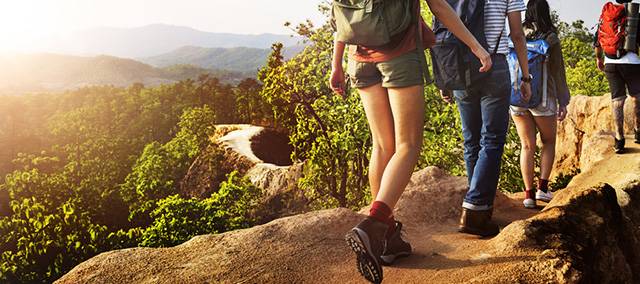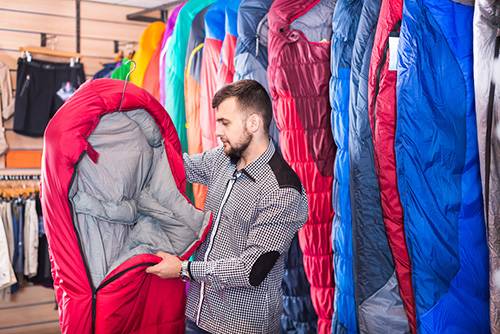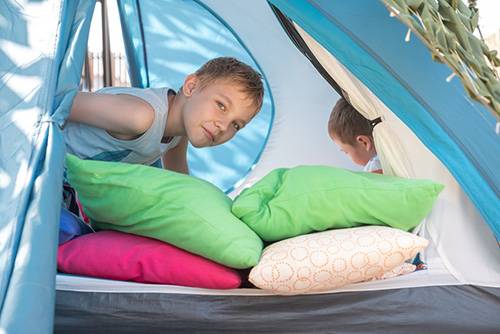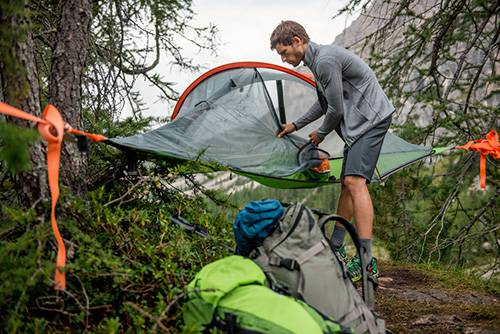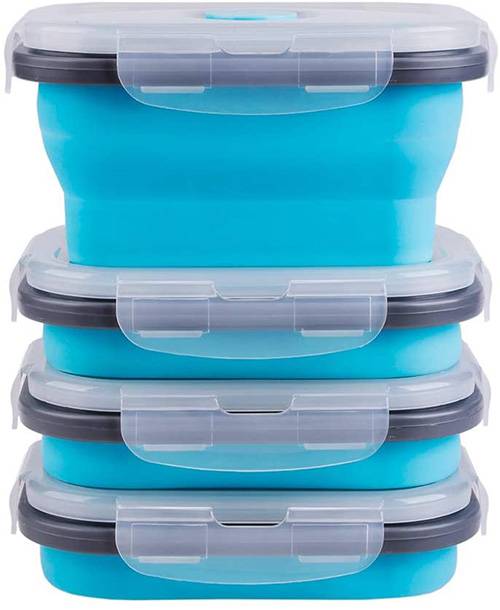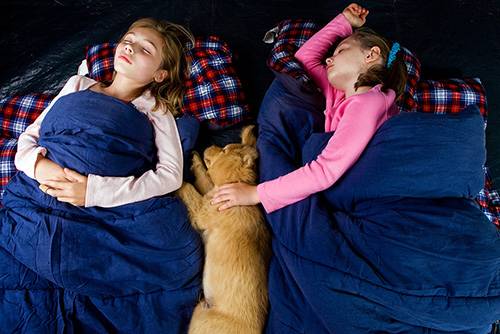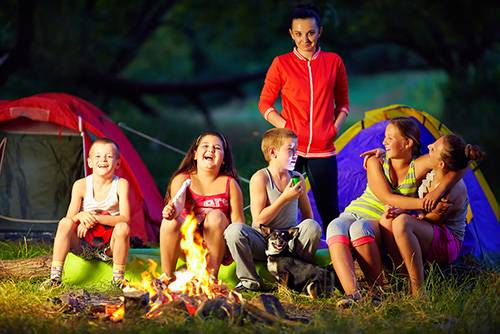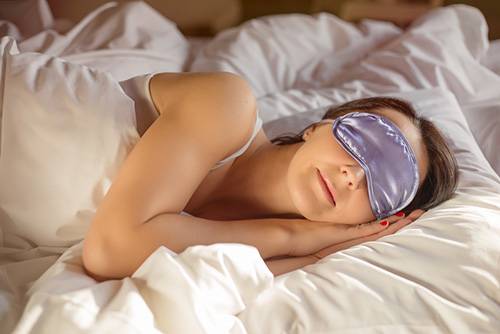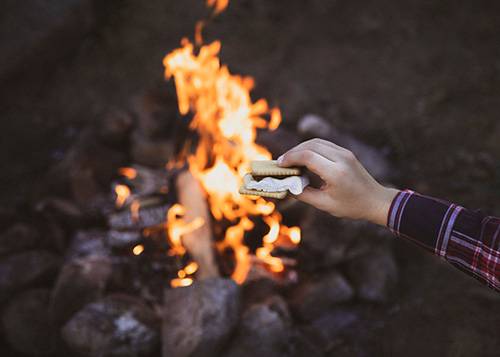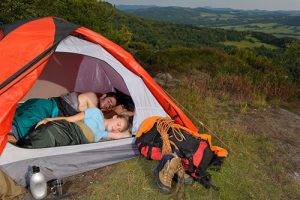
Getting a good night’s rest while camping doesn’t have to be a guessing game, however. There are plenty of tips and tricks that will help you fall asleep faster and stay asleep longer even in the depths of the forest around you. If you follow some or all of these tips, you are sure to be able to enjoy your camping adventures all day long having slept so well the night before.
1. Get Some Exercise
This may seem like it goes without saying, but the more active you are during the day, the more restful you will feel at night. When camping, the chances of hiking, kayaking, and doing other outdoor sports are high, so these activities are great in order to promote wanting to sleep later on. Hiking is a great way to explore your area and get in plenty of exercise that will help you wind down toward the end of your day. This doesn’t mean you should hike 30 miles, but hiking means that you’ll be walking more than usual, especially if you are in some rockier or mountainous terrain, so this means that you body will naturally feel compelled to rest and recharge for the next day of new adventures.
2. Bring Comfortable Sleeping Gear
You know that 20-year-old sleeping bag that you’ve had in your closet or garage? Just throw that out and get yourself a brand new, comfy sleeping bag that is plush and smells good. The gear that you choose to sleep in will impact how well you sleep significantly. It may seem like a great idea to cut costs on sleeping gear since you already have some, but the older your gear is, the more likely it is to be uncomfortable and probably smells a bit strange by now. Sleeping gear isn’t meant to last forever, so while you may just be using it at least once a year, it definitely will have an expiration date when it comes to getting decent sleep.
The more plush, quilted sleeping gear is the type of gear you are going to want to go with, as it is soft enough to prevent you from feeling like you’re sleeping on hard ground (though you more than likely will be) and it will create a pillowy effect that will naturally make your body more relaxed and feel more at ease. If you plan to sleep in something that you wouldn’t mind sleeping in within your own home, you’re on the right track as this is the perfect mindset to have when picking out your new, comfy sleep gear to take on your next camping trip.
3. Bring Your Pillow
When travelling, sometimes simple comforts from home, such as your favorite bed pillow, can help you feel more relaxed and more able to fall asleep faster. The same concept applies to camping out in the woods – if you have a favorite pillow, go ahead, and bring it with you. Not only will it comfort you at night, but it will smell like your usual home environment and will make you feel like you actually want to fall asleep. Some people may have designated pillows and blankets to use while going on a camping trip, but it’s perfectly fine to bring your pillow from home to camp in order to get a little extra piece of mind while trying to fall asleep.
After all, a pillowcase and even the pillow itself can be washed, so you don’t have to worry about ruining any pillows you take with you. Most standard pillows and pillowcases are made of either satin or cotton, so these textiles can easily be washed and even dried in your standard washing machine and clothes dryer. You can easily wash away the smell of camping and wilderness, and your pillow will start to smell like home again in no time. Totally worth the extra wash cycle if it means you get to fall asleep a little faster and stay asleep a little longer.
4. Bug Protection
In order to get good sleep, you are going to want to take plenty of bug protection. Nothing will make a night more miserable than buzzing mosquitoes and flies in your ears. You will end up spending most of the night smacking away bugs than actually resting. To keep bugs away while you’re trying to sleep, you can either use a bug body spray or even a mosquito net. If you spray on a bug repellent at night, followed by sleeping within a mosquito net, you should be good to go and won’t be bothered all night from bug bites.
Most standard camping tents come with bug netting or mosquitos netting, so as soon as you zip up that tent you shouldn’t have any more bugs inside of the tent. The bug repellent spray will help keep any existing bugs that have entered the tent from biting you. Also, in the evening before bed, as you are still moving around your campsite. Citronella candles can really help keep mosquitoes away so you can enjoy your dinner by candlelight and bug free. Always make sure to use extreme caution when using open flames such as candles at a campsite, especially if you are camping during the drier months of the year. Always keep citronella candles in the line of sight so that you can be extra sure that you’ve blown out all of the candles before everyone heads off to bed.
5. Store Food Items Before Bed
To get some peace of mind, store all of your food items before bed in airtight containers. Nobody wants to have bears or raccoons making a bunch of noise at night stealing your food, so always make sure that you are storing all of your food items in specific containers. This will not only protect your food supply, but this will protect you and your family from encountering unwanted visitors in the dead of night. Bears are especially known to break into food containers, so if you are camping in an area that has bears, you’re going to want to make sure your food is extra secured. This will not only bring you comfort knowing that your food is safe, but you will naturally also sleep better without having any animals come into your campsite and make noise.
Some animals can be more pesky than others. For example, raccoons are known to be incredibly agile and they can use their fingers to unlatch locks and unscrew bottles at times. Storing your food in an airtight, odor proof container and then hanging it up high somewhere can help prevent even the most agile critters from breaking into your food stores. Also, nothing is more terrifying than the idea of a huge bear lumbering around your tent, so just keep that in mind while sorting your food items. You definitely don’t need any massive unwanted dinner guests, so make sure if you are camping in an area that has bears, so buy bear appropriate storage containers.
6. Go to Sleep at Your Usual Bedtime
It may be a bit difficult to stick to your normal bedtime while camping but sticking to as close to your normal bedtime routine as possible could be a very important factor when it comes to getting a good night’s rest. Our bodies actually like routine, so if you stick to the same sleep schedule every night, your body will naturally grow accustomed to it and start to feel sleep by that time each night. When camping, you may want to stay up late and talk around the campfire, which is absolutely fine and all part of the camping experience, but you may notice that you won’t feel as sleepy at a later time.
Your body is trying to adjust to the new timeframe instead of reverting naturally to your old bedtime. Trying to stick to this original timeframe will help your body fall asleep naturally and on schedule. You will even wake up at your usual time, as your body is also used to a certain time to wake up, as well. If you are worried about not getting enough sleep while camping out, try to stick to this usual bedtime in order to feel more rested the next morning.
7. Avoid Campfire Scary Stories
While it may be a classic campfire tradition, some people in your party may just not like to share horror stories around a campfire. Scary stories are, well, scary, as you know, and some people may be more sensitive to these kinds of stories than others. Either way, horror or scary stories told around a campfire will put you more on edge and can actually affect the depth of your sleep later on. If you are someone who tends to spook easily, or you will have to sleep alone in a tent and you know you’ll be tossing and turning thinking about the last scary story, you might want to skip out on this campfire tradition.
To avoid this type of stress, you can always keep the campfire story sharing but you can make them fun stories instead of scary stories. This will probably put plenty of people within your camping party at ease and no one will have to look like a scaredy cat not wanting to participate. This way, everyone, including small children, can partake in this fun camping tradition and no one will feel scared later and unable to sleep that night. It’s a win-win for everyone involved, scaredy cat or not.
8. Wear an Eye Mask
To keep out the sun and to help you fall asleep faster, wear an eye mask. This will not only keep out the early morning rays, but this is also a great trick to just make yourself fall asleep. With an eye mask on, all you can really do is shut your eyes and wait for sleep to come. This is kind of a great way to just force your eyes to close and fall asleep on your own. This will also prevent the sun from waking you up way too early, so taking an eye mask with you on your next camping trip will prove to be extremely useful.
Within this same concept, you should also take some ear plugs as these will help keep out the noises of the forest or the woods and help you fall into a more restful sleep. The noise of crickets and rustling through the trees overhead or movement in the bushes around your campsite can put anyone on edge, so ear plugs will just help you fall asleep much faster and keep you asleep for much longer. They are great to carry while traveling so make sure to always pack a pair with you.
9. Meditate
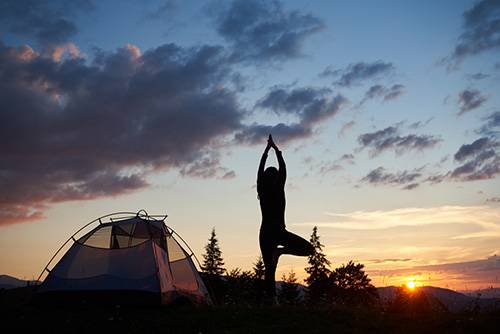
10. Avoid Too Many Sweets
Kind of like the tradition of sharing scary stories around a blazing campfire, the same applies to eating a crazy amount of smores. These delicious, sugary sweet snacks are pretty much a staple for anyone going on a camping trip, and while one or two may be fine, you’re going to want to limit the sugar intake if you are planning on falling asleep at all that night. Sugar acts as a natural stimulant to the body, and the more you eat, the more likely it is that you will have some trouble winding down that night. Eating sweets like smores right before bed may seem like a super fun idea (and who are we kidding, it totally is a fun thing to do) but you will definitely regret it when night falls and it’s time to curl up in your sleeping bag.
Pretty much any type of sweet (and a lot of them) right before bed is a bad idea. So, whether it’s s’mores or twinkies or cupcakes, you are going to want to limit yourself to one, maybe two max, if sleep is a big concern for you. A good way to avoid this sugar load-up is by eating these types of sweets earlier in the day so you have plenty of time to burn them off throughout the day through hiking or canoeing. Once night approaches and you all start telling your stories before bed, one smore should cut that sugar craving and keep you a part of the group.
The Wrap Up
As you can see, there are so many great tips to help you fall asleep fast during a camping trip. Not only fall asleep fast, but even keep you asleep for a longer period of time so you can fully enjoy the next day and not feel sluggish or worn out. You can easily use all of these tips in conjunction with one another to put you in the ultimate state for sleep, but even if one or two of these tips seems doable, then just go with that. Overall, these tips are meant to help you, so obviously only stick with the main tips that really resonate with you.
You should also share some of these tips or your favorite tips with other members of your camping party, as you won’t be the only one finding it difficult to sleep during the night of a camping trip. Even try taking some extra eye masks and ear plugs just in case someone really can’t fall asleep and had no idea that these two nifty items could help. Also partaking in a group yoga and meditation exercise can help, as the whole group will be able to participate and fall asleep easier. Not getting enough sleep definitely won’t be an issue on your next camping trip if you make sure to follow these nifty tips. Happy camping!
Photo credit: CandyBox Images/Shutterstock; Rawpixel.com/Shutterstock;
Iakov Filimonov/Shutterstock; Elena Shashkina/Shutterstock;
ZoneCreative/Shutterstock; MPH Photos/Shutterstock; Olesia Bilkei/Shutterstock;
Kaspars Grinvalds/Shutterstock; natoliy_gleb/Shutterstock; Vita Olivko/Shutterstock;
